When we began fostering, our intention was always to help the kids placed in our home in whatever way we could, and our hope was to eventually adopt some children. Right now we are right about seven years from when we started that journey by beginning classes, and I can say we’ve adopted much more than four children. While they’ve been grafted into our family (immediate and extended), their biological parents and extended families have been grafted into ours in beautiful ways. We decided early on that as long as it was safe, there were just too many positive benefits of maintaining contact with children’s biological families.
“We decided early on that as long as it was safe, there were just too many positive benefits of maintaining contact with children’s biological families.”
Our children come from two different biological families. Our relationships are different, but we maintain contact with both. One mom we knew from the time her children were in our home as foster children, and we saw her in court, at some appointments, family team meetings, and a visit at our home for her to see where and how the kids lived. Because we knew each other, we were able to keep in touch after termination of parental rights (TPR) and adoption.
The other mom I had met just once at her final court hearing about a week before the kids moved in. I was able to introduce myself and give her a hug before the caseworker came over to discuss something. After termination, we wanted to maintain contact, but the caseworker was unable to locate her. Two years of holidays and birthdays and Mother’s Days went by with no way to let her know her children loved her and thought of her, no way of sharing their growth or their safety, no way of learning about their family, and no way of asking important questions for health or other reasons.
“…no way of learning about their family, and no way of asking important questions for health or other reasons.”
Then something miraculous happened, what I would consider a divine appointment! Darren was out of town for a week for work, and my mom and I decided we needed to get the kids out of the house with some gift certificates we had to a bounce night at a gymnastics place about 45 minutes away. The kids were putting their shoes in cubbies when I heard someone say their names and turned to see their mom. Both her children looked at her strangely and began to run off to play. It had been two years, and this was so out of the context of what they were expecting! One bolted to the fun while the other stood there looking at her with a puzzled expression. She said, “[Name], I’m your mother.” Hugs and tears ensued as we were soon encircled by aunts, uncles, cousins, and grandparents who hadn’t seen the kids in 7 years who were at the place for a birthday party of a 7 year-old cousin the kids had never met.
The family quickly assured me that they were safe and would not try to take the children and that they were so relieved to just know who they were with and that they were safe and well. Tears streamed as I shared pictures from my phone of the last two years while the kids reunited with cousins and family and met the cousin born after their CPS removal. We ate birthday cake, my other children joined in and got their faces painted and met the family. I was given so much information about their family I couldn’t begin to remember it all, and family members shared their grief and the story of the removal seven years earlier and their devastation during the five years that the children’s mom was able to visit but that they were not. An aunt shared how she had wanted custody but was too young and without a place of her own yet to get the kids. There was so much joy and laughter as we all got to know each other. One child had arms around me and the bio mom and kissed us each on the cheek saying, “I love you, Mom,” to each of us. It is a memory I treasure always.
After returning home that night, a family member had posted several pictures for me on Facebook of the children and their family from their days before foster care. I shed tears of ultimate joy as I doted over these two’s pictures and sat looking at them with the rest of the family, joking about a now crazily skinny child’s babyhood chub and declaring what adorable babies and toddlers they were. I experienced something I never thought I would, seeing my babies as babies, and these kids regained a part of their history. There’s no worrying now about what to do for school assignments or graduation picture ensembles that request young photos of them. I’m scrapbooking their story from birth, not from the time they came to our home.
A short time after that night, I received a Facebook message from a family member that the kids’ grandfather, whom we’d met at the birthday party, had passed away. We were able to attend the visitation and funeral and meet even more family, including one of the kid’s bio dads and his mother. I fell in love with this family where our kids began their lives.
The blessings and relationships from that “chance” meeting continue to this day, yet I know our story is not everyone’s. Birth family relationships after adoption are not always a possibility, and this heavy decision of whether to maintain contact, if not part of the adoption agreement, usually rests solely on the shoulders of the adoptive parents. How will you decide whether or not or in what way to stay in contact with your child’s birth family?
Here are 7 considerations for you:
So you’re trying to determine whether or not to allow contact with your child’s biological family.
- Safety
Safety is the number one concern when it comes to continued contact with a child’s biological family. This is a no-brainer—if the biological family is somehow very dangerous, stay away! While the children may have been declared unsafe in their home, they may be safe in a supervised, neutral location. Reasons for removal may have little to do with the biological parents being dangerous, and in this case, there may be no reason why not to stay in touch. - Immediate Impact on the Child(ren)
You have to ask a series of questions: What behavioral impact does contact with family have on the child? Is it severe and life-altering enough to interfere with their well-being? How does the family treat the child? Does the family want contact?
If the impacts to the child are negative, the family doesn’t want to see the child (for whatever reason, whether it’s too painful or they are not interested), or the family treats the child or your family poorly (in words or actions), contact should not continue. One of our children had severe behavioral impacts following a post-TPR visit which greatly impacted school achievement and behavior and home life. The child recognized the why’s of the behavior (amazing for the age of the child!), and we were able to talk through whether or not the relationship should continue and how it should. Eventually, the child was able to sort out that they wanted the relationship to continue after some time, and we no longer see such negative results, but for a while, contact had to be limited. - Long Term Identity for Your Child(ren)
Everyone experiences times in their life where they search out their own identity, but this is often difficult for adopted children with gaps in their personal history. Birth family relationships allow a way for these gaps to be filled in. The grown adoptee does not have to decide whether to search for the biological family—they already know them! - Information
There are so many questions we cannot answer for our adopted children as adoptive parents: Did anyone in the family have genetic medical issues? What was the child’s birth story? Were they premature? What was their early development like if they were not adopted as an infant? How were their names chosen? Who do they look like? Where did their family originate from? Who are my extended family members so I don’t unknowingly marry my cousin?! Adoptees have a right to their family information. - Type of Contact
Openness and contact in adoption lies on a large continuum, from simply sending information and pictures to being an on-going part of daily life. Our family currently has mainly phone, mail, and social media contact because of physical distance after we had to move out of state to find work, but we previously also visited. Frequency has varied and changes up and down with schedules and circumstances. Sometimes the contact is more between myself and their family as kids pop on the phone for a couple minutes and run off to play. Sometimes it’s exchanging photos or updates via text message, and sometimes it’s wishing each other Happy Mother’s Day in a Facebook message. The type of contact is dictated by all the other 6 considerations listed here. - Timing
We were advised by many professionals in child welfare to allow some time to pass after TPR before beginning visits or calls. Time brings healing, and often wounds are too fresh for both children and family to have contact in the beginning. A new normal can be established in the lives of everyone involved, providing a basis for healthy interaction. - The Child’s Wishes
Finally, the desires of the child (along with their age and reasoning ability) should be taken into consideration, and these likely will change over time. Do they want to see their biological family? Discuss the possible outcomes as a family, and keep communication open.
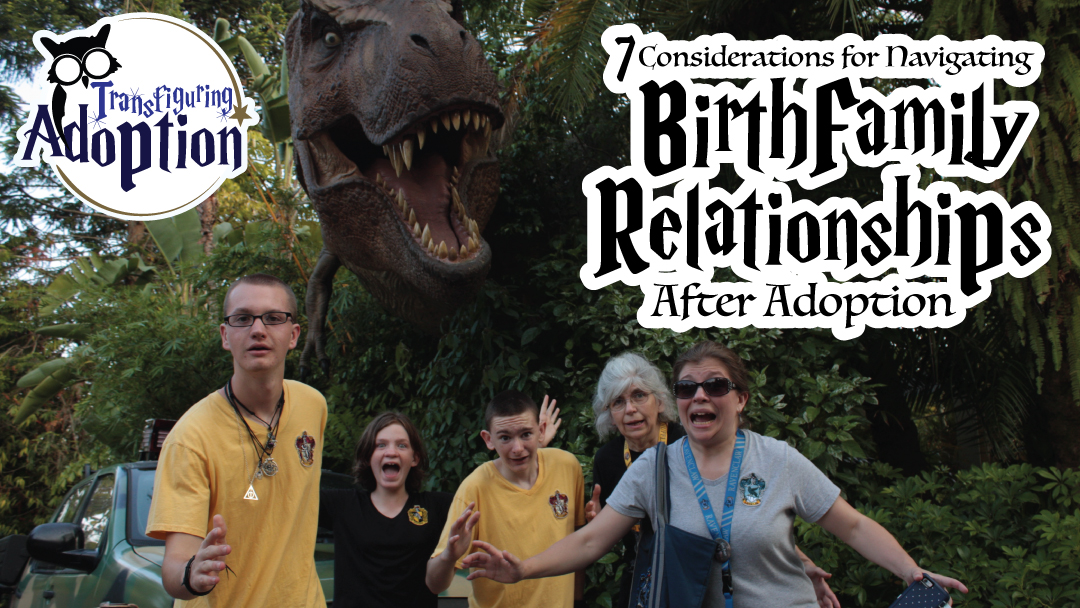
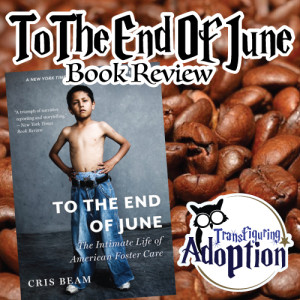
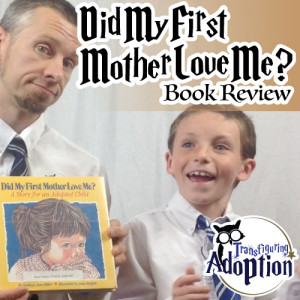
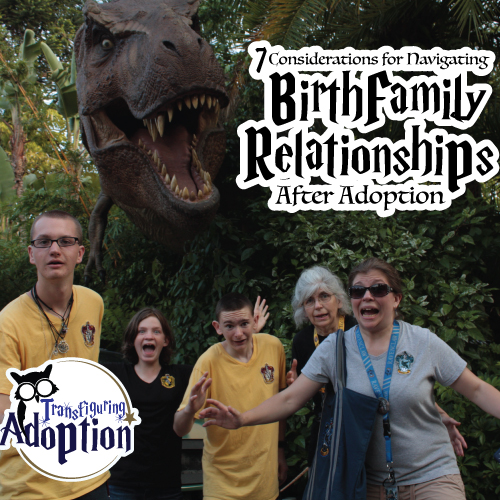
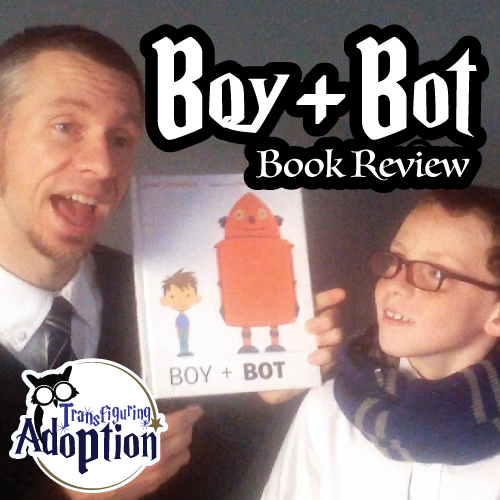
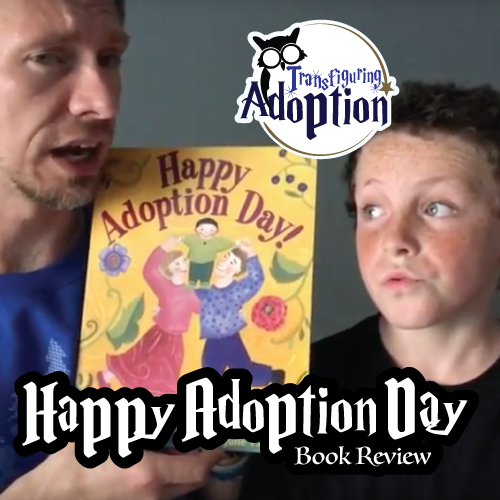
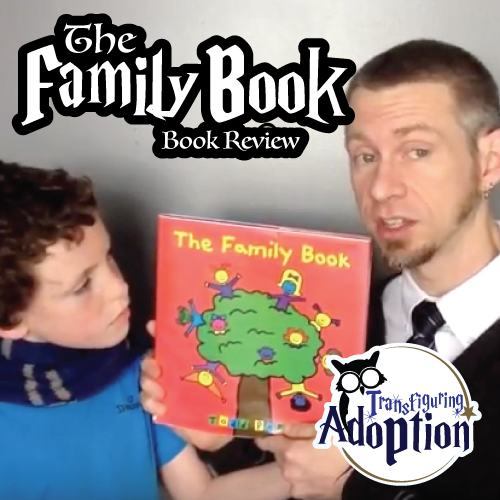
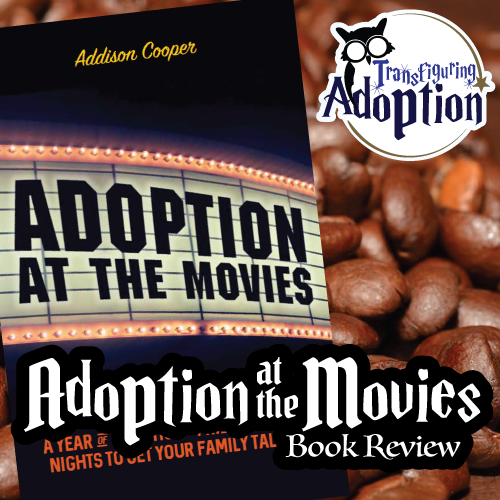

Lynn
Your post is wonderful! It shows your huge heart for welcoming your children’s bio family as your own, and not feeling the need to compete with them. I have always felt it’s not either/or but rather and/both.
We, too, adopted through foster care. We tried to maintain an open adoption relationship with the caveat that the biological parents were drug free and law abiding. Unfortunately, they have not been able to do that long term. 🙁 My daughters’ biological grandmother is involved in a small capacity; unfortunately her health is poor, which limits the ability to visit in person.
Someday I hope we live in a world where adoption, at least through foster care, is not necessary. Until then, people like you create the best-case scenario for foster adoption, not just for the kids but their bio family as well.
grtlyblesd
Wow, what a neat scenario! My girls are from China, so birth family contact is not even a possibility, but your story made me smile.
rachel
Great list! I think #7 should be #1. 🙂
Belinda
I wouldn’t consider the page of writing a relationship, the adopters will take seriously. From what we have learned so far, simply a chore until an excuse can be found to stop. It will be an annual reminder of why my GD is gone. Opening old wounds. A reply required to be in a style that none of it matters. All I want is for my GD to be happy and I will have no proof either way. Will never discover if any of it was taken seriously. Hiden in a box until she is 18. All we are is acknowledgement of a paper exercise.
CBP
I didn’t find out about My Grand Daughter till she was about 7 yrs Old I had no Information just a first name. My son sighed over parental rights when he found out about her after birth My son who has been diagnosed with Asbergers got scared and as he has done through out his life he Ran from her. I just want Her to know that She is loved beyond words and that She has a Large Biological Family in this world. She was Adopted by two Dads that Love Her, and have been giving Her a Life Enriched with Family and a Broad Culture I am and Will be Eternally Grateful